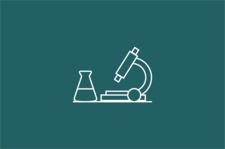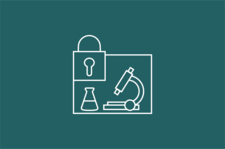Knowledge transfer and applied research
Our R&D activities serve to maintain and expand all the competencies needed to protect human, animal and plant health. This enables us to better assess risks, act appropriately in crises and respond promptly to new challenges.
Knowledge transfer activities are carried out through publications and lecturing activities by our experts and at external events, as well as through the AGES Academy program.
Our research is applied research. The focus of research and experimental development is on generating new knowledge from existing knowledge, e.g. through studies and assessments, but also on conducting analyses and developing methods.
Our strengths
- sustainable institutional knowledge
- broad, cross-sectoral, specific and practice-oriented expertise
- comprehensive and good quality data material from official and regulatory activities of analytical and testing services
- a comprehensive research infrastructure, including reference laboratories and testing stations
- cooperation or organization as project partner of bilateral, European and international capacity building projects
Research Report
The report on our research, experimental development and knowledge transfer activities, or research report for short, is prepared annually.
Due to the legal mandate and the extensive range of tasks, we are obliged to conduct applied research and to communicate relevant scientific knowledge to a broad public through our knowledge transfer activities. AGES provides Austrians with highly qualified experts and staff who carry out research activities on an ongoing basis, represent Austria in national bodies and those of the EU, and carry out their work conscientiously in accordance with legal requirements.
The research reports of the past years can be found at the bottom of this page under Downloads.
Knowledge transfer
You will find current examples of our offered knowledge transfer formats as well as successfully implemented Capacitiy Building projects at the end of the page under Downloads. There you can also find out about our current expert tariff.
Research Infrastructure
Our research infrastructure includes more than 90 reference laboratories and reference centers, 11 government laboratories with special tasks, two L3 laboratories (Vienna, Graz) and one L3+ laboratory (Mödling), experimental stations in four climatic regions, two research glasshouses, and numerous public/official registries, inventories, and collections.




- National reference laboratories (according to EU Control Regulation 882/2004), reference centers and official laboratories
- Reference stations, research glasshouses and (high-security) laboratories: Reference stations in 4 climatic regions with a total of 30,500 test plots (field testing)
- Lysimeter station in Vienna
- 2 research glasshouses with
- in total 3.500m² high glasshouse area
- 84 autonomous compartments (from cabins with floor space of 6.7 m² to compartments with 50 m² floor space)
- Vascular experimental station
- 6 quarantine cabins
- 2 phytotrons
- 1 earth house
- 1 rolling house
- laboratories and high security laboratories :
- 540 laboratories on 13,843.1m2 floor space in total - of which:
- 2 L3 laboratories
- 1 L3+ laboratory
- 540 laboratories on 13,843.1m2 floor space in total - of which:
Research co-operations
Our scientists have an extremely broad range of expertise and work together with renowned national and international experts as part of research collaborations.
Together with external partner organisations, research projects are implemented in all of our business areas, which range from food, drug and medical product safety to animal health, public health and food security, or we work together in research networks.
The work in the research networks serves the purpose of professional networking, knowledge transfer and the establishment of strategic partnerships, e.g. for joint project submission or project implementation, but also for cooperation in the event of a crisis. Research collaborations exist with universities and other research institutions at national and international level.
For the successful implementation of scientific work and research projects, we have cooperation agreements at national level, e.g. with the Federal Ministry of Agriculture, Forestry, Climate and Environmental Protection, Regions and Water Management and the Federal Ministry of Labour, Social Affairs, Health, Care and Consumer Protection, the University of Natural Resources and Life Sciences Vienna, the University of Veterinary Medicine Vienna, the Medical University of Vienna, Gesundheit Österreich GmbH, Campus Science Support Facilities GmbH or via the "b5" competence network on soil as an environmental medium. We are also co-editors of the journal "Die Bodenkultur - Journal for Land Management, Food and Environment". We also have cooperation agreements at international level, e.g. with the German Federal Institute for Risk Assessment (BfR), the Deutsche Gesellschaft für Internationale Zusammenarbeit GmbH (GIZ) and the Federal Office for Food Safety and Veterinary Affairs (BVL) in Switzerland.
Official affairs
In official and regulatory matters, we work closely with the following organizations:
- European Commission, Brussels
- European Food Safety Authority (EFSA)
- European Centre for Disease Prevention and Control (ECDC)
- European Medicines Agency (EMA)
- Health and Food Audits and Analysis (europa.eu)
- World Organisation for Animal Health (OIE)
- European and Mediterranean Plant Protection Organization (EPPO)
- Joint Research Centres of the European Commission (JRC)
Research Networks
We are members of various renowned research networks, such as the Climate Change Centre Austria (CCCA), BIOS Science Austria, the Association of German Agricultural Research Institutes (VdLUFA) or the Working Group for Food, Veterinary and Agricultural Sciences (ALVA).
In addition, our staff members are members of a large number of scientific societies, which also reflect our broad professional expertise.
Below you will find links to cooperation partners with whom we already have a working relationship.
- AED - Agency for Economic Cooperation and Development
- ALVA - Working Group for Food, Veterinary and Agricultural Sciences
- BIOS Science Austria - Association for the Promotion of Life Sciences
- GÖCH - Society of Austrian Chemists
- European One Health Association
- B5 Corporate Soil Competence
- CCCA - Climate Change Centre Austria
- FOODSECURITY.at (AMA, AWI, AGES, ICC)
- Biodiversity Network Austria
-
ZRK - Center for Risk and Crisis Management
- AIT - Austrian Institute of Technology
- APA Science - Austria Press Agency
- COMET Project "D4dairy
- fhg - Center for Health Professions Tyrol GmbH
- FOODSECURITY.at (AMA, AWI, AGES, ICC)
- University of Agricultural and Environmental Education (HAUP)
- Cooperation BMG-VetMedUni-AGES
- Cooperation Campus-Vienna-Biocenter
- Cooperation University of Natural Resources and Applied Life Sciences Vienna
- Cooperation University of Veterinary Medicine Vienna
- K1-Center "FFOQSI
- ÖGE - Austrian Society for Nutrition
- PHP - Public Health Pool - Association of Veterinary Medicine in the Public Health System
- tecnet equity - Lower Austrian Technologiebeteiligungs-Invest GmbH
- UBA - Federal Environmental Agency
- AENOR – Spanish Association for Standardisation and Certification
- ANSES
- BfR - Bundesinstitut für Risikobewertung
- bsi – British Standard Institution
- CDC Taiwan – Centers of Disease Control R.O.C. (TAIWAN)
- Cooperation Ministry of Agriculture of the Republic of India
- Cooperation Kazakh Research Institute for Plant Protection and Quarantine, Kazakhstan
- Cooperation Shahid-Beheshti-Universität Teheran Iran
- ECPGR – European Cooperative Programme for Plant Genetic Resources
- EFSA-Focal-Point – AGES
- EJP Soil
- EUREKA - Institute Of Public Health Maribor
- FAO – International Treaty on Plant Genetic Resources for Food and Agriculture
- IAEA - International Atomic Energy Agency
- KSL Turkey – Kalite Sistem Laboratories Turkey
- One Health EJP
- UKZUZ – Central Institute for Supervising and Testing in Agriculture
- VDLUFA – Verband Deutscher Landwirtschaftlicher Untersuchungs- und Forschungsanstalten
Better Training for Safer Food Focal Point
Better Training for Safer Food (BTSF) or a "Better Training for Safer Food" is a training initiative of the European Commission.
The main objectives of BTSF are to organize and develop an EU training strategy with a view to ensuring and maintaining a high level of consumer protection as well as animal health, animal welfare and plant health; to continuously improve and harmonize official controls in EU countries; to create the conditions for a level playing field for food businesses contributing to the EU's priority for jobs and growth; and to harmonize control procedures between EU and non-EU partners.
We are the focal point and contact person for BTSF stakeholders in Austria. Our experts regularly provide their expertise as tutors in international BTSF trainings.
Contact address for interested parties: btsf@ages.at.
Training activities
Training activities have been in place since 2006. Courses are offered in EU and non-EU countries and are aimed at staff of competent authorities dealing with official controls from EU and selected non-EU countries. Participation in BTSF activities is through the competent authorities in each country. BTSF contact points have been appointed in EU Member States and certain other non-EU countries to coordinate the selection of participants.
Last updated: 21.07.2025
automatically translated